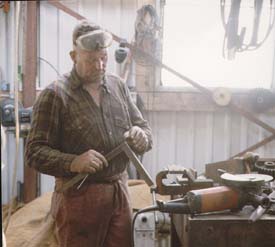|
Dat geit los The Case of Bernhard H. |
|
| Regie/ Director:
Harriet Kloss
Drehbuch/ Screenplay: Paul-Albert Wagemann Kamera/ Camera: Markus Thoess Schnitt/ Editing: Christiane Thude Musik/ Music: Cesár Roson Rollen/ Cast: Produktion/ Production: Pinguin Filmproduktion Kloss + Thoess, Förderung Funding by Kulturelle Filmförderung Schleswig-Holstein Adresse/ Address: Pinguin Filmproduktion, Otto-Suhr-Allee 59, 10585 Berlin, Tel: +49-30-82703452, Fax +49-30-82703451 Internet/ Internet: Deutschland Germany 1997/8, 72 Min., 16 mm (1:1,33), Farbe colour |

|
| Inhalt/ Summary Im Herbst 1989 verlor der damals 50jährige, alleinstehende Schleswiger Landwirt Bernhard Haar durch eine Zwangsversteigerung seinen Hof mit dazugehörigem Wohnhaus, Land, Vieh, Scheunen, Stallungen und Maschinenpark. Seitdem lebt er auf einem bei der Versteigerung vergessenen Weidenzipfel an der Bahnlinie Kiel-Flensburg, wo er zunächst einen Blechcontainer, dann eine solide Scheue errichtet hat. Eine Sozialwohnung in der Stadt lehnt er ab. Stattdessen kämpft er mit der Hartnäckigkeit eines Michael Kohlhaas und den Mitteln eines Don Quijote um ein vermeintlich weiterbestehendes Besitzrecht bzw. um eine angemessene Entschädigung. Er fühlt sich im Recht, denn für den Verlust seines Hofs macht er ein betrügerisches Komplott seiner Bank verantwortlich. Die Filmemacher begleiten Bernhard Haar durch seinen Alltag. Sie zeigen die Auseinandersetzungen mit den Behörden und Begegnungen mit den Nachbarn und lassen ihn die Geschichte aus seiner Sicht erzählen. In the fall of 1989, Bernhard Haar, an unmarried, then 50-year-old Schleswig farmer, lost his farm along with his house, land, animals, barns, stalls and machinery when the bank foreclosed on his mortgage. Since then, he has lived on a strip of land along the Kiel-Flensburg railway line that was forgotten in the auction. At first, he lived in a sheet-metal hut, then built a solid barn on the property. He refuses to accept a council flat in the city. Instead he fights for his right to stay on the land or to receive adequate compensation with the stubbornness of Kleist's Kohlhaas and the methods of Cervantes' Don Quixote. He believes he is in the right and accuses the bank of fraudulent conspiracy. The filmmakers accompany Bernhard Haar on his everyday chores, during his confrontations with the authorities and his dealings with his neighbours, and let him tell his own story. |
|
|
Harriet Kloss, geboren 1963, machte eine Ausbildung zur Fotografin und arbeitete zunächst als Kameraassistentin, danach als Regieassistentin und freischaffende Filmemacherin in Berlin. Sie ist Mitbegründerin der Pinguin Filmproduktion, die neben Dokumentar- und Kurzspielfilmen auch Industrie- und Imagefilme produziert. Paul-Albert Wagemann studierte Sprachen und Politikwissenschaften und ist - nach langjähriger Lehrtätigkeit - seit 1989 freischaffend als Rundfunk- und Buchautor tätig.
Harriet Kloss, born in 1963 in Berlin, trained as a photographer and began working as an assistant camerawoman, then as assistant director and independent filmmaker in Berlin. She co-founded Pinguin Film, which produces documentaries, short features and industrial films. Paul-Albert Wagemann studied languages and political science and works - after a long period of teaching - as a freelance writer of books and radio programmes since 1989. |
|
| Filme (Auswahl)/ Films 1986: "Memory Party"; 1987: "Ein englischer Sommer"; 1990: "Absatz", "Biete..."; 1991: "André Rival - Fotograf"; 1992: "Marathon und mehr..."; 1993: "The Rose of Tralee"; 1994: "Ich lobe das Wort - Mythos und Wirklichkeit der Waldorf-Schule" |
|
|
|
blättern |
|